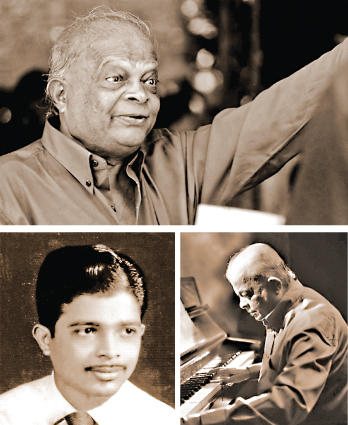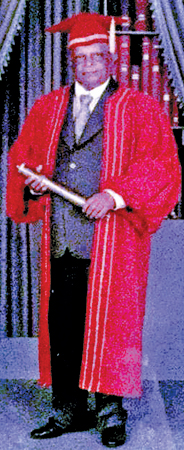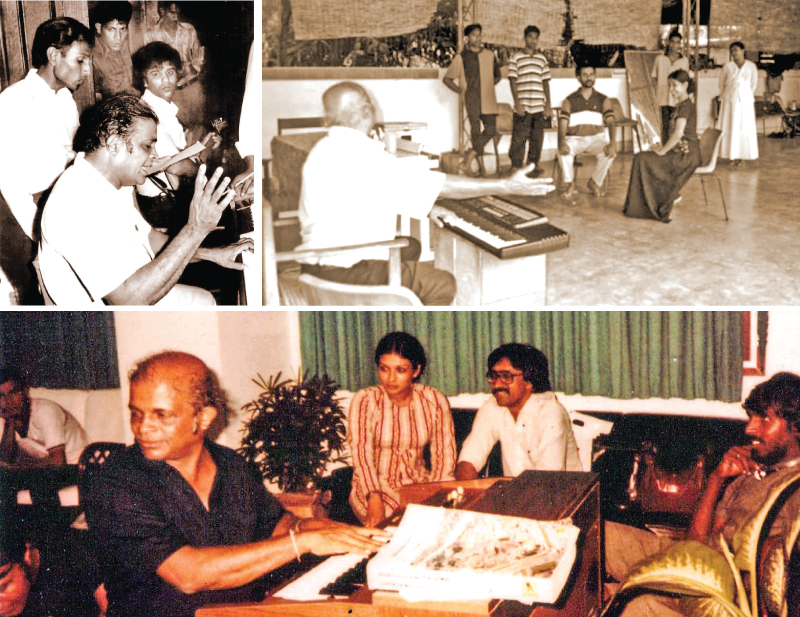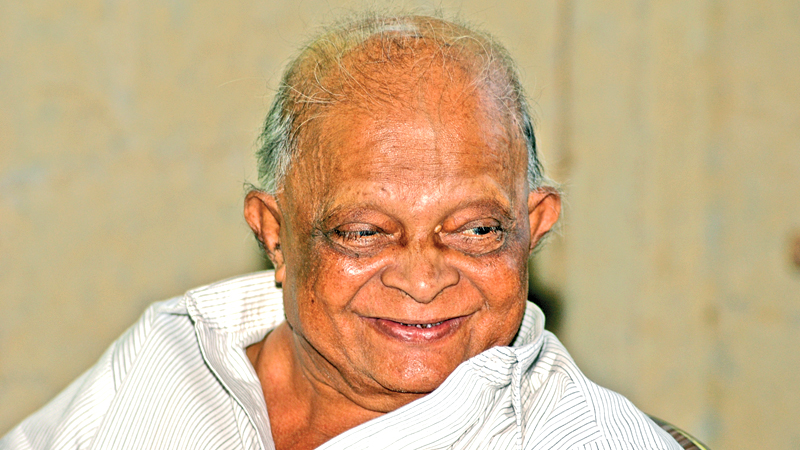Premasiri Khemadasa, a name etched in the annals of Sri Lankan music history, was no ordinary composer. With four decades of dedication to his craft, Khemadasa’s legacy continues to resonate, celebrated as a rare gift to the Sri Lankan music. His commitment to his art intertwined tradition with innovation, elevating the musical experience to unprecedented heights.
In a life marked by simplicity and a relentless pursuit of musical perfection, Khemadasa’s creative spirit knew no bounds. From humble beginnings to international acclaim, he stretched his expertise across a vast spectrum of musical genres, from songs and theatre to films and opera. His life was a testament to the belief that artistic brilliance is not bound by material possessions or formal education, but rather, it is ignited by the fervour of creativity.
Khemadasa’s unique musical vision was rooted in the harmonious convergence of Eastern and Western influences. It earned him both ardent supporters and vocal critics. The very essence of his work defied conventional categorisation, as he masterfully blended Eastern aesthetics with Western instruments, forging a distinct musical identity that transcended boundaries.
 His compositions, whether ballets, symphonies, cantatas, or operas, carried the unmistakable imprint of a visionary who believed in the transformative power of music. Folk poems and traditional ragas were not preserved in their original form but moulded and modified to resonate with the contemporary world, a philosophy that became the cornerstone of his success.
His compositions, whether ballets, symphonies, cantatas, or operas, carried the unmistakable imprint of a visionary who believed in the transformative power of music. Folk poems and traditional ragas were not preserved in their original form but moulded and modified to resonate with the contemporary world, a philosophy that became the cornerstone of his success.
As an unwavering advocate for the profound influence of words, Khemadasa’s connection to music transcended the mere auditory realm. He believed that a libretto’s appeal was the key to a treasure trove of musical interpretation. Words were the foundation upon which he built his symphonic masterpieces, and they were the rhythm that breathed life into his compositions. His dedication to words was a testament to his belief that music was a universal language, to be felt and experienced, rather than simply understood.
Harmonising tradition and innovation
Khemadasa was often criticised for condemning Eastern music and following Western music, but he remained committed to his vision. Khemadasa’s philosophy was to blend Eastern and Western music, but he did not always follow it himself. He praised Western instruments, but he also had a deep appreciation for Eastern aesthetics. His music cannot be easily labelled as either Eastern or Western; it is a unique blend of the two.
Khemasdasa took his music to the world, captivating audiences with his ballets, symphonies, cantatas, and operas. He believed that folk poems and traditional ragas should not be used in their original form, but should be moulded and modified to suit the contemporary world. This philosophy was the key to his success.
Khemadasa experimented with musical styles from around the world and combined them with local folk tunes, Hindustani rhythms, Western melodies, and many other forms of music to create his unique style.
He maintained his distinctive features in his music scores, from Nandisena Cooray’s Sepatha Soya to Sanath Gunathilaka’s Ekamath Eka Rataka, outshining his contemporaries. Two examples of his influence from folklore are Jayantha Chandrasiri’s Dandubasnamanaya and Amarasiri Peiris’ vocal performance of Balanna Nanda May Numbe Guhavai in Jackson Anthony’s teleplay Esala Kaluwara.
The outstanding melody gave prominence to the voice of the vocalist while minimising instrument contribution, conveying the theme of impermanence. Many do not know that this master musician was himself gifted with a melodious voice. He was a dab hand coaching the students to perform their voices properly, with his own voice.
Words, rhythms, and spiritual inspiration
Everyone, as Master felt, is born with a talented voice, and it needs to be trained. Although he did not directly admit it, Buddhist philosophy played a major role in every inch of his creativity. His much famous cantata Pirinivan Mangallaya shows his influence from the oriental philosophy. All his creations contained more or less oriental themes. For him, Jataka stories had musical components, and Buddhist Suttas could tremble the earth if delivered in a proper melodic sense.
 When he introduced these foreign styles, he was scoffed at primarily for the impossibility of grasping operas, symphonies, and cantatas. Music is a universal language, which transcends the mortal verbal order. They are not to be understood, but to be ‘felt’.
When he introduced these foreign styles, he was scoffed at primarily for the impossibility of grasping operas, symphonies, and cantatas. Music is a universal language, which transcends the mortal verbal order. They are not to be understood, but to be ‘felt’.
The Master had immense trust in words. If the wordings were appealing, any poem or lyric would become a libretto for him. He would consider it a treasure, though the Master claims the ownership of the libretto afterwards.
“It’s a matter of converting textual order into a musical interpretation. We should ‘feel’ the rhythm of words, and then only we enjoy the musical interpretation,” he was once quoted as saying to a few of his close associates.
“Once the musician started working on the libretto, the librettist can no longer claim any rights. It belongs to the musician. The libretto is something, and the score is something else. What you hear is the musician’s composing, not the librettist’s.”
Unyielding principles
He was not just a Master, but he was full of humanism whom even the kings could not buy. It was 1982, and he was awarded as the best music director for Dharmasena Pathiraja’s Soldadu Unnehe. Cameras panned in the direction of Master, who stood up at the announcement and left the premises rejecting the award, protesting against the unfair imprisonment of Vijaya Kumaratunga.
Just as in Opera, Cantata and Symphony, the word ‘Master’ is derived from Maestro in Italian. The word is used in respect of the music master. Khemadasa was the only ‘Master’ in Sri Lanka, which was not dropped even after he was conferred with an honorary doctorate by the Ruhuna University. This epitomises Master’s stronghold as the unrivalled genius of our time.
Once a private television channel was scheduled to telecast an opera theatre to mark the dawn of the millennium. All the arrangements were complete for the massive opera theatre with the rehearsals drawing to a close, when Master changed his mind at the eleventh hour since something did not please him.
He gave up the project, but later compiled his last CD containing the untelecast opera theatre and Doramadalawa, one of his famous operas, and titled it Doramadalaven Dambaranvellata. Prof Sunanda Mahendra composed a libretto for Dambaranwella (originally titled Sahasra Yathra) while Lucien Bulathsinhala did for Doramadalawa. His last creation was Agni Opera, a libretto written by Eric Illeapparachchi, to celebrate his seventieth birthday.
Small-made septuagenarian
Age was not a barrier to this small-made septuagenarian though ill health may have slowed his pace. He was jovial, always ready for a hearty laugh, and sometimes seemingly drowsy at banquets probably due to sleepless recording nights. He was focused on creativity until the memory started fading gradually.
Death has no reason to be proud of in taking over the virtuoso. As John Donne said, it is but a short sleep and the memory of this beloved autocrat in his own hard-fought realm will remain eternal.







